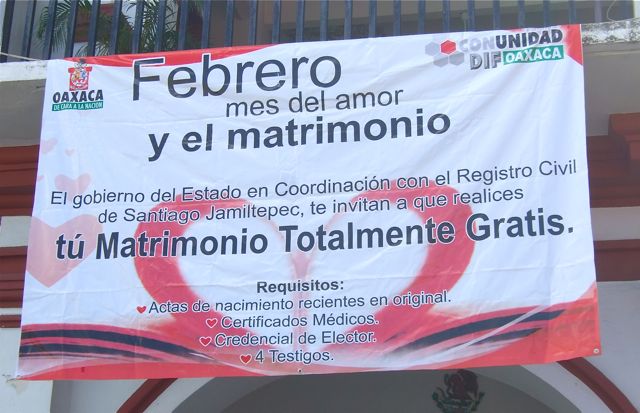
Marriage, Mexican Style
For better or for worse, people keep tying the knot. But when a marriage dissolves because of death or divorce, untangling the knot can be a legal nightmare, especially when there is property to be divided.
Since there are so many marriages between Mexican nationals and foreigners, both in Mexico and abroad, we thought we would consult a Mexican lawyer, Alina Felix of Notaria 128, to learn more about marital arrangements in Mexico.
In Mexico there is a complete separation of church and state — so you cannot be legally wed by a priest; all marriages are civil and take place at the local marriage registry. Living together after a religious ceremony but without a civil ceremony is the same as being in a “common-law” relationship as pertains to your legal rights.

Anna Nicole Smith, the Playmate of the Year, who married a very old billionaire and then tried to claim his estate when he died, would have had no case at all in Mexico where wives inherit fifty percent of the wealth accrued after the wedding. But our Mexican Anna could have had her husband transfer part of his property to her and then it would have been hers, clear and simple, especially if the marriage was one of separate property (Separación de Bienes).
When you marry in Mexico you must indicate whether the marriage will be of separate or joint property (Sociedad Conyugal Legal). If you choose “joint property”, then 50 per cent of property acquired during the course of the marriage belongs to your spouse in case of death or divorce. Neither spouse can buy or sell property without the other’s written consent and both partners are responsible for any debts taken on during the marriage. Joint property does not include inheritances or lottery prizes. However, if the money is used to buy a house, the house will be considered joint property.
One advantage of a joint property union is that it protects the stay-at-home spouse in case of death or divorce. However, every state in Mexico has its own marriage laws. In some states and DF women who stayed home to raise the children are also entitled to 50 per cent of the property, even with a separate property agreement. Most marriages in Puerto are joint property unions.
In a separate property union, the property of each spouse remains his or her own, to administer as they wish, the same as if they were not married. In this case, neither partner is responsible for the other’s debts.
You may, at any time, change from one system to the other by obtaining a writ from a family judge or the civil registry.
No matter which option you choose, a foreigner married to a Mexican cannot claim any property, bought at any time, within 50 km of the coast. Even if the property has a clear title (escritura) it cannot be transferred to a foreigner without there first being a fideicomiso (bank trust). If the property has an act of possession (acta de posesión), instead of a deed, it can never be claimed by the foreign spouse. When Mexican children inherit or are given property; it is almost impossible for that property to be sold or transferred before the child is 18.
One solution to the property conundrum, favored by some prudent foreigners, is to form a Mexican corporation with your spouse. In this case your home, for example, becomes commercial property on which you pay rent and taxes to the corporation. Foreigners are allowed to own Mexican corporations.
The Civil Registry in Puerto is located at the Agencia Municipal.
Foreigners marrying Mexican nationals must have the approval of the Mexican Office of Migration (oficina de migración). The document is called "Permiso para contraer matrimonio con un nacional", and it must be granted in the office which has jurisdiction over where the marriage is to take place. (A permit issued in Huatulco is no good in Puerto Escondido.) It can take from two days to two weeks for the document to be processed, depending on the office. The permit costs around $200 U.S.
Other required documents include an original of your birth certificate (and divorce decrees and death certificates) with a certified translation. All relevant documents must be notarized with an apostille stamp. You must also have a passport, valid for at least 6 months, and the appropriate visa (a tourist card is acceptable).












